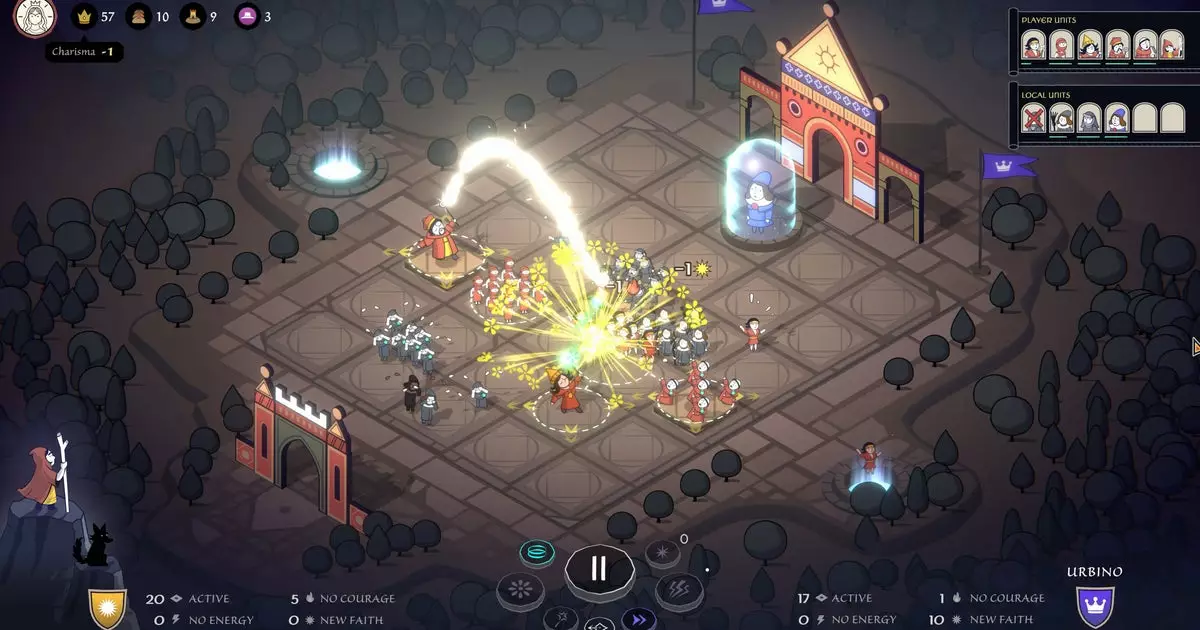“Becoming Saint” presents an intriguing blend of roguelike mechanics and satirical storytelling that expertly critiques the intersection of religion and societal norms in 14th-century Italy. As players navigate the intricacies of becoming a saint while maintaining a humorous tone, the game makes a bold statement on the moral battleground of faith. Rather than simply facilitating a sterile experience entrenched in righteousness, the developers intentionally play with the conventions of religious narratives to create a game that revels in its absurdities.
At its core, “Becoming Saint” thrusts players into the role of a preacher tasked with gathering believers while addressing socio-political dynamics. Gaming enthusiasts will appreciate the innovative approach that rewards players not just for their moral choices but their political alignments. The narrative unfolds through a quirky blending of character design and choice-driven gameplay, where each decision influences not only the preacher’s fate but the social fabric of the towns they engage with.
Dynamic Gameplay: Navigating Moral Quandaries
The game’s central mechanics hinge on choice, inspired by roguelikes but rife with self-awareness. Players start their journey with three distinct narrative choices, establishing the foundation of their character’s political and spiritual alignment. Upon selecting a whimsical animal emblem—like the wolf that serves as a foundation for character identity—players immediately engage with the complexities of societal perception. The wolf, symbolizing both strength and beauty for the preacher, ironically becomes emblematic of capitalist caricature amidst theological quests.
This clever juxtaposition infuses the experience with layers of irony. By promising florins and riches in a medieval context where bread is an essential lifeline, players prompt both skepticism and intrigue amongst the populace. The strategic element intensifies as believers of different social classes respond variably to the protagonist’s evolving narrative, creating a push-and-pull dynamic reliant on social commentary.
Tactical Battles and Charismatic Comedy
However, as the game embraces humor, it doesn’t shy away from offering players tactical battles. The confrontational aspect of “Becoming Saint,” presented through grid-based real-time strategy mechanics, cleverly simulates religious zealotry’s combative nature. With followers possessing distinct attributes, players delight in finding innovative strategies during encounters. A Book-wielding Monk may flummox uneducated Peasants, embodying the balance of esoteric knowledge and mundane wisdom. In contrast, others might specialize in scrambling for alms, showcasing the game’s tongue-in-cheek approach to spirituality as a commodity.
In this whimsical representation, Open Lab Games has combined pop-up cardboard towns and parchment scroll menus reminiscent of historical documents, cleverly immersing players into an alternate medieval universe. The vibrant art style, likened to that of Kate Beaton’s comics, drives home the light-hearted nature, allowing players to feel engaged without losing sight of the game’s thematic ambitions.
A Journey Influenced by Beliefs and Sins
Yet, the humor is not without depth. There lies an underlying commentary on the human condition—the drive for canonization juxtaposed against the restrictions of societal norms and personal failings. The protagonist’s encounter with the Inquisitor—who levies sentences for so-called “minor sins”—bears resemblance to the arbitrary nature of morality. This element invites players to consider what is truly ‘sinful’ versus society’s perception of right and wrong. Choices evolve the protagonist’s fortunes, and hence the progress toward becoming a saint becomes not just a quest for divine approval but a reflection on humanity’s foibles.
The endgame embraces both triumph and drudgery, as exemplified by the ludicrous yet celebratory climax—the eventual canonization after 968 years in purgatory. Such an absurd conclusion underscores the game’s message: attaining holiness remains an inherently messy, often humorous pursuit.
With its distinctive take on a familiar genre, “Becoming Saint” invites players to explore the divine while simultaneously critiquing the powers that govern belief. The blend of tactical gameplay and whimsical storytelling positions it as both a thought-provoking and entertaining experience—a unique venture in a genre ripe for innovation.

